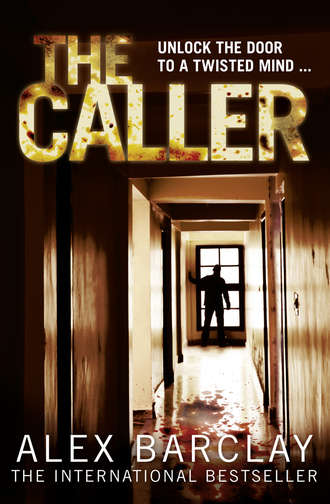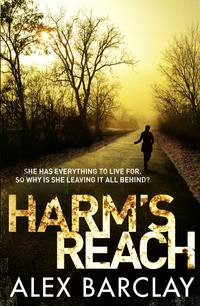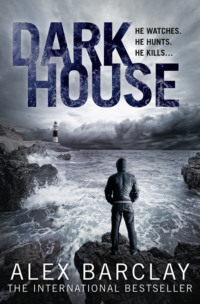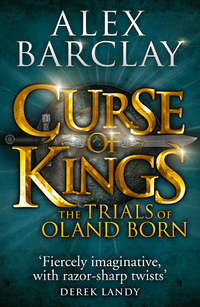
Полная версия
The Caller

ALEX BARCLAY
The Caller

Copyright
This is entirely a work of fiction. The names, characters and incidents portrayed in it are the work of the author’s imagination. Any resemblance to actual persons, living or dead, events or localities is entirely coincidental.
HarperCollinsPublishers
1 London Bridge Street
London SE1 9GF
www.harpercollins.co.uk
Published by HarperCollinsPublishers 2007
Copyright © Alex Barclay 2007
Daphne Du Maurier quote reproduced with permission of the
Curtis Brown Group Ltd on behalf of the Estate of Daphne Du Maurier
copyright © Daphne Du Maurier 1938
Cover design layout © HarperCollinsPublishers Ltd 2016
Cover photographs © Shutterstock.com
Alex Barclay asserts the moral right to be identified as the author of this work
A catalogue record for this book is available from the British Library
All rights reserved under International and Pan-American Copyright Conventions. By payment of the required fees, you have been granted the non-exclusive, non-transferable right to access and read the text of this e-book on-screen. No part of this text may be reproduced, transmitted, down-loaded, decompiled, reverse engineered, or stored in or introduced into any information storage and retrieval system, in any form or by any means, whether electronic or mechanical, now known or hereinafter invented, without the express written permission of HarperCollins e-books
Source ISBN: 9780008180881
Ebook Edition © SEPTEMBER 2008 ISBN: 9780007279425
Version 2016-05-13
Praise for Alex Barclay
‘The rising star of the hard-boiled crime fiction world, combining wild characters, surprising plots and massive backdrops with a touch of dry humour’ Mirror
‘Tense, no-punches-pulled thriller that will have you on the edge of your deckchair.’ Woman and Home
‘Explosive’ Company
‘Darkhouse is a terrific debut by an exciting new writer’ Independent on Sunday
‘Compelling’ Glamour
‘Excellent summer reading … Barclay has the confidence to move her story along slowly, and deftly explores the relationships between her characters’ Sunday Telegraph
‘The thriller of the summer’ Irish Independent
‘If you haven’t discovered Alex Barclay, it’s time to jump on the bandwagon’ Image Magazine
Dedication
To Ciaran, Ronan, Lorraine and Damien
With screaming eyes
And weakened breath
’Twas not for life
He begged,
’Twas death.
Anonymous
Table of Contents
Cover
Title Page
Copyright
Praise for Alex Barclay
Dedication
Epigraph
Prologue
Chapter One
Chapter Two
Chapter Three
Chapter Four
Chapter Five
Chapter Six
Chapter Seven
Chapter Eight
Chapter Nine
Chapter Ten
Chapter Eleven
Chapter Twelve
Chapter Thirteen
Chapter Fourteen
Chapter Fifteen
Chapter Sixteen
Chapter Seventeen
Chapter Eighteen
Chapter Nineteen
Chapter Twenty
Chapter Twenty-One
Chapter Twenty-Two
Chapter Twenty-Three
Chapter Twenty-Four
Chapter Twenty-Five
Chapter Twenty-Six
Chapter Twenty-Seven
Chapter Twenty-Eight
Chapter Twenty-Nine
Chapter Thirty
Epilogue
Acknowledgements
Keep Reading …
About the Author
Also by Alex Barclay
About the Publisher
PROLOGUE
The room was eight by ten and windowless. Weak shafts of light stretched through the bars that ran from floor to ceiling across one wall. The small television, mounted on a black shelf outside, was full-volume white noise. On a tray by the door lay the shriveled remains of an overcooked dinner.
The bed, pushed against the right-hand wall, was perfectly made, each corner tight under the thin mattress, the coarse green cover smooth except for where he sat, hunched and focused. Sweat darkened the folds and underarms of his blue shirt, the odor mixing with the rising stench from the discarded food.
He opened his eyes and turned to the desk lamp beside him, flicking the switch. Under the brilliant white light, he held a model; a plaster replica of the thirty-two human teeth he could recall so easily as he traced his thumb over the contours; the imperfection of a prominent incisor, a pointed canine tip, the uneven surface of a chipped premolar. Only once had he seen the teeth in a smile: at the beginning, a quick flash before the terror struck. For hours afterwards, they had been clamped shut in agony or visible only as the lips curled back from them in a silent scream.
He bent forward and slid a box from under the bed, pulling it up to rest on his knees. Twisting his body, he removed a key from his pocket, then unlocked the box. He looked at the model one last time, then set it down inside with the others. One, two, three. Four.
The day after you watch your first victim die is not very different to the day before. You still wake up. Maybe you skip breakfast, even lunch, but you will eat … eventually. And you’ll sleep. And you’ll slip into a rhythm. Not identical to the one before; there might be an erratic beat, but at least it’s a silent beat. Yours.
He pushed the box under the bed, where other reminders lay – of lives taken and lives spared. He closed his eyes and breathed in the warm, captive air.
My prison is a tool, a training ground, a stopover. I look at the bars behind me, the space around me, the confinement. I think of where you are and how tragic for you it is that here I am, there you are, but oh so quickly, there I am. Right with you.
Entrance. Exit.
He switched off the desk lamp. He returned the key to his pocket, stood up and walked to the door. He slid back the bolt and stepped outside. He reached up and turned off the television, watching as the light was sucked into a tiny circle at the center and turned to black. Then he walked across the floor and up the steps, pausing as he crossed the threshold into his bright, air-conditioned home.
She was twenty-nine years old, small and slender, dressed in a white tank, pale pink cardigan and jeans, her dark hair twisted and secured with a dragonfly clip at the nape of her neck. Her skin was sallow, her eyes winter blue. Beside her was a doll, made from instructions that lost her interest before the mouth was sewn and the brown wool hair could be bunched and tied with bows. Beside that lay a clay ashtray, half-painted and dented by pressured thumbs.
She couldn’t remember why she had sat down. She opened the desk drawer and took out a laminated prayer card and red St Pio rosary beads. Wrapping them around her fingers, she bowed her head and began to pray. She told St Joseph that she dare not approach him while Jesus reposed near his heart.
From nowhere, it rose, a familiar unsettling pressure in her stomach. Her only relief was that somewhere mixed in with the fear came a euphoria she had never found anywhere else. But only the fear washed over her now. Her left hand shot out and slammed down onto a notepad. She slid it across the desk towards her, her head feeling free from her body as she tried to make use of what was happening to her. A dark reel unwound behind her eyes; edited razor-sharp, black and gray shapes, a frenzied acceleration of badly lit scenes. Her right hand groped the air, her fingers searching for two short vertical lines that would make it all pause, then backwards arrows to make it rewind. But this was nothing she could control. Coursing through her was the impulse to stay in the moment, not to go back, not to cast any light onto dark half-memories. But before she got a chance to write, she was gone, sliding to the floor, dragging paper and pens and pencils on top of her. The last thing she saw was her friend, standing in the doorway, shrunken to the size of a child.
Detective Joe Lucchesi sat with his head between his knees, tears streaming down his face and dripping onto the carpet below him. His face was gray, his forehead dotted with sweat and newsprint from the fingers he had pressed against it before the real pain had kicked in. Half an hour earlier he had arrived at his dentist’s office for emergency treatment – with pain he had gauged level eight. Now it was off the scale and rising. Nausea ripped through him, but he stayed doubled over, letting out a growl that choked in his throat.
‘Joe? Joe?’ A receptionist rushed in from the hallway. ‘Stay with me, sweetheart.’
She glanced around the waiting room. ‘Did anyone see what happened?’
‘He was sitting right there reading the newspaper, he took a call on his cell. He sat back down and then he started not to look too good.’ Joe knew it was the voice of a kind-faced older man who was sitting opposite him when he arrived.
The receptionist laid a hand on Joe’s shoulder. ‘Dr Makkar will be along right away. Is there anything I can get you in the meantime?’
‘Would he maybe take a glass of water?’ It was the man again. He had stood up – Joe could see his brown suede loafers on the carpet in front of him. Joe managed to raise a shaky hand that said no to both offers.
‘I don’t think he was even able to talk to whoever called him,’ said the old man.
But Joe knew it wasn’t the pain that had stopped him from talking. He just had no answer for the voice that came twisting its way back into his life, drawling and heavy and laden with unfinished business.
‘Detective Lucchesi? Every time you look at the scars on your wife’s pretty little body, right down … low down on that tight little belly. Or when you flip her over onto her front. She’s light, you can flip her easy, can’t you? There’s some scars there too – makes me feel like I’m the gift that keeps on giving. Well, what I want to know is this: when you see them scars? Do you still want her?’ He paused. ‘Or do you want me more?’ He laughed long and loud. ‘Tell me. Who’s gonna get it in the ass? Little Anna Lucchesi or Big Bad Duke Rawlins?’ His breath was gone, lost in a dead silence. Then his voice struck up, one last time. ‘And Detective? You’ll never bury me. I. Will. Bury. You.’
ONE
Detectives Joe Lucchesi and Danny Markey stepped into the elevator that would take them to the sixth floor office of Manhattan North Homicide. They were three hours into an eight to four tour. A short skinny man shot in after them, jumpy and light on his feet.
‘You know, I can read futures by your hands.’ He had weathered skin and a droopy left eye. He stood an inch from Joe’s chest and looked up at him with a gentle smile. Joe looked at Danny and held his palm out.
The man stepped back, banging his head on the elevator doors.
‘Not your palm!’ he shouted. ‘Not your palm! The back of your hand! I will know you from the back of your hand.’ Joe turned it over.
‘The other one too. You too,’ he said, looking at Danny. ‘Both hands. Both hands. Many hands make Jack dull.’
Joe and Danny smiled and did what he said.
‘You’re laughing too early,’ said the guy. ‘This could be bad news, what I see here. This could be too many ducks spoiling the bush.’
‘We don’t want to hear no bad news,’ said Danny. ‘Right?’
‘Right,’ said Joe.
‘Right,’ said the man. ‘But I’m not just the messenger here. You gotta appreciate that. I’m how it all begins. I’m what sets it all in motion. I’m, like, bang. And the future I see will start from right here in these nine stitches.’
Joe nodded slowly.
The man reached up and adjusted the purple crocheted hat on his head, pulling the ear flaps around so one of them hung in front of his face. He rotated it again, then looked back at their hands.
‘Yeah,’ he said. ‘I’m seeing things. I definitely am,’ said the man. ‘My name is One Line, by incident. One Line. King of Madison Avenue. Your product in one line. Your brand in one line—’
‘You were a copywriter?’ said Joe.
‘Your future in one line,’ said the man, staring at the hands in front of him.
‘OK,’ said Danny. ‘So what is it?’
The bell chimed and the elevator doors opened on the sixth floor. Joe and Danny got out. As the doors slid together, One Line pushed his face close to the gap.
‘One line: you’re fucked, both of you. Is that two lines? Could that be two?’ The doors closed.
They laughed.
‘Another EDP for the HPD,’ said Danny. An EDP was an Emotionally Disturbed Person. The HPD was the Department of Housing Preservation and Development – one of their jobs was to give out Section 8 housing subsidies.
‘Let’s send him into Internal Affairs, let him tell them they’re fucked,’ said Danny.
‘I’d like him to come up with a whole jingle for that,’ said Joe.
Sixteen detectives worked in three teams out of Manhattan North Homicide, a modern open plan space with a small glass-walled office in the corner, shared by the sergeant and the lieutenant. The NYPD was one of the only law enforcement agencies in the country whose officers weren’t put through regular fitness checks, leaving Sergeant John Rufo free to work his way up to 230 pounds and into his current predicament of trying to work his way back down.
‘Your mental agility is being impaired,’ he said, pointing at Joe and Danny with something beige speared on a fork.
‘Is that tofu?’ said Danny.
‘No it is not tofu. It is marinated steamed chicken. Tofu. Gimme a break.’
Joe and Danny exchanged glances.
‘It’s eleven o’clock in the morning,’ said Danny.
‘Eat little and often,’ said Rufo. ‘Them’s the rules.’ He pointed to his plate. ‘Vegetables, protein …’
‘Yeah, boss,’ said Danny. ‘Tomato sauce, meatballs: I got it covered already.’
‘How do you stay so trim?’ said Rufo.
‘You mean, “Have I been working out?”’ said Danny.
Rufo rolled his eyes. Then poked his fork through his salad. ‘Who’s up today?’
‘Me,’ said Joe. ‘And I eat well, by the way.’
‘You gotta watch that French food,’ said Rufo, looking up at him. ‘It’s tasty …’ he raised a finger in warning, ‘… because it’s rich. Your wife is genetically wired for it. You might not be. You’re in shape now, but who knows down the line …’
Joe laughed. ‘Yeah, Sarge, thanks for looking out for me.’
‘A varied diet,’ said Rufo, ‘that’s what—’
The phone interrupted him. ‘Ruthie, yeah – put him through.’ He nodded. ‘How you doing? OK. Yeah. OK.’ He listened, then scribbled on a notebook in front of him. ‘Right away. Detectives Joe Lucchesi and Danny Markey. Yeah. Uh-huh. Take care.’ He put down the phone. ‘Gentlemen, we have a homicide on West 84th Street. Here’s the address. Guy found in his apartment.’ He ripped out the page and handed it to Joe. ‘The Two-Oh is at the scene already.’
Joe and Danny crossed Broadway to the parking lot under the railway bridge.
‘Who says “trim”?’ said Danny.
‘People who aren’t,’ said Joe.
‘It’s unbelievable,’ said Danny, ‘we get sucked into food talk every time we go in his office. I wind up starving.’ Danny was short, wiry and had no extra weight. He’d been wearing the same suit size since he was eighteen. He had pale skin and fading freckles, light brown hair and blue eyes. Joe was six-three, dark and broad.
Joe stopped. ‘Aw, shit …’
‘What?’ said Danny.
‘Would you look at that?’ Joe walked over to a silver Lexus. ‘That fucking shit.’ He pulled his keys out of his pocket and opened the door of his car, popping the glove box. He took out a cloth and started rubbing at a lump of tar on his windshield.
‘I’ve a pain in my fucking ass with that crap,’ he said. He looked up at the bridge from where the tar dripped in the heat.
‘Least it was a fresh one,’ said Danny. ‘How come you don’t have the ghetto sled?’ The ghetto sled was a detective’s B-team car, the one he could park two blocks from the projects and not have to worry about.
‘We got a meeting at Shaun’s school today, I’m going straight there. Or at least I would have been. Anna’s going to have to go it alone.’ Shaun was Joe’s eighteen-year-old son.
‘She won’t like that,’ said Danny. ‘What’s he been doing now?’
Joe shook his head. ‘You name it.’
‘He’s been through a lot.’
‘Yeah, but it’s fucking wearing me down. And Anna doesn’t need this kind of shit, going up to the school every month to answer to this asshole teacher fifteen years younger than us.’
‘Shaun’s a good kid,’ said Danny. ‘He’ll be in college next year, you won’t have to worry. Try having four under ten. I love them, but, man …’ He breathed out. ‘Now, come on. Say goodbye to the nice car and get into the shit one.’ There was a pool of five cars at Manhattan North. Any damage during a tour and the driver was left to face a bawling out by Rufo. The newer the car, the more likely Joe would take the wheel. Today, they had the oldest car – a gray Gran Fury; ‘You get a scratch on it, who gives a shit?’ said Danny. They pulled out and joined the traffic heading south on Broadway.
‘Can I ask what happened with Dr Mak?’ said Danny.
Joe grunted. ‘I staggered in, I got more Vicodin, I walked out.’
‘That’s it?’
‘That’s it,’ said Joe.
‘You mean that’s all you let it be, right?’
‘Who are you? Psych services?’
Danny ignored him. ‘I’m guessing you went in, told him you were real busy, just needed a prescription, gotta go.’
‘What else am I going to do?’ said Joe.
‘Let him treat you,’ said Danny.
Joe had TMD – Temporo Mandibular Joint Dysfunction. The least it would do was make his jaw crackle when he opened his mouth, the worst – spark excruciating pain all over his head. For years, Danny had watched him pop over-the-counter painkillers and decongestants. He’d recently moved on to Vicodin.
‘It’s getting worse,’ said Danny.
‘Yeah, so are you.’ Joe turned away. Yesterday’s phone call had jerked him back too far – to events he had spent wasted months trying to forget: the botched rescue of an eight-year-old kidnap victim and the near-destruction of his family. The little girl had been returned to her heartbroken mother and the two clung to each other, happily, desperately. Seconds later, the scene turned to graphic, bloody images he still couldn’t shake – the kidnapper had blown them up in retaliation for calling the cops. Joe confronted him moments later and pumped six bullets into his chest. His name was Donald Riggs.
After the case, Anna wanted Joe to take time out. She was offered a job in Ireland and they went with Shaun. After eight great months, everything went wrong. Donald Riggs had an associate – Duke Rawlins – a killer he had spent years on a murderous spree with, someone who wouldn’t let Riggs’ death go unavenged. Fresh from a maximum security prison, he had caught up with Joe and tried to destroy his family. During their time in Ireland, Shaun’s girlfriend, Katie, had been murdered. Shortly after, Rawlins had abducted Anna and left her so physically and mentally scarred, she struggled every day to get past it.
They pulled up by the patrol car outside the apartment block on West 84th Street. A well-dressed couple stood under the green and gold awning, aware something was going on, but more concerned about where they were going for brunch. The doorman inside was a neatly groomed older man with a mustache and a badge that read ‘Milton’.
‘Terrible,’ was all he said, shaking his head, gesturing with a white gloved hand to the elevators.
‘Has someone spoken with you yet?’ said Danny.
Milton nodded.
‘All right,’ said Danny. ‘We’ll be back down to you in a little while.’
‘Why were you shouting at him?’ said Joe when they got into the elevator.
‘Didn’t he look a little deaf to you?’
Joe raised his eyes to the ceiling. They got out at the third floor and walked down a gray tiled hallway to apartment 3E. A detective in a navy blue suit walked out, his eyes on the notebook in his left hand. His right hand was pressed to his stomach. He turned slowly their way. Danny and Joe made their introductions.
‘Tom Blazkow from the Two-Oh,’ he said. The twentieth precinct covered everywhere from 59th Street to 86th Street, west of Central Park. Blazkow was in his mid-forties and bulked-up, with a gray buzzcut, a massive jaw and bloodshot blue eyes. He turned to the detective walking out of the apartment behind him.
‘This is my partner, Denis Cullen.’
They all nodded. Cullen was in his early fifties and dressed in a limp brown suit and a tie from a bowling league with a stars-and-stripes pin. He had pale red hair thinning on top and broken veins across his nose and cheeks. He looked eager, but worn out.
‘So what have we got?’ said Joe.
Blazkow spoke. ‘Ethan Lowry, graphic designer, DOB 04/12/71, married with a young daughter. 911 got a call from his diet delivery people. Every morning, they bring his meals for the day. He didn’t open the door. First time in eleven months he didn’t. Delivery guy saw a drop of blood in the hallway, got a bad smell.’ He pointed to a pale, wheezing teenager. ‘The two uniforms tried the bell, banged on the door, no answer, went around the back, climbed up the fire escape, couldn’t see nothing through the window, so they called ESU. Body was right inside the front door. No sign of forced entry. Balcony door was locked. No response from the wife’s cell phone. We got a uniform down by the elevators. He knows who to look out for. You’re going to have to knock.’ He pointed to the apartment. ‘Careful going in. You might slip on a chunk of face.’
Joe reached into his jacket pocket for a handkerchief and a small bottle of aftershave. He shook some drops onto the white cotton and held it to his nose, taking in a few deep breaths. He knocked on the door and they walked carefully into the apartment. Ethan Lowry lay on his back, naked, his body pressed up against the baseboard behind the door. His arms were stretched out above him. His head was turned to the right, but there wasn’t much of a face to face that way. Ethan Lowry had been savagely beaten, more blows than were needed to kill someone who had clearly been finished off with a bullet. The damage was entirely to his face. Where the skin wasn’t plumped up and tight, it was pulped. His nostrils were plugged with dried blood.








